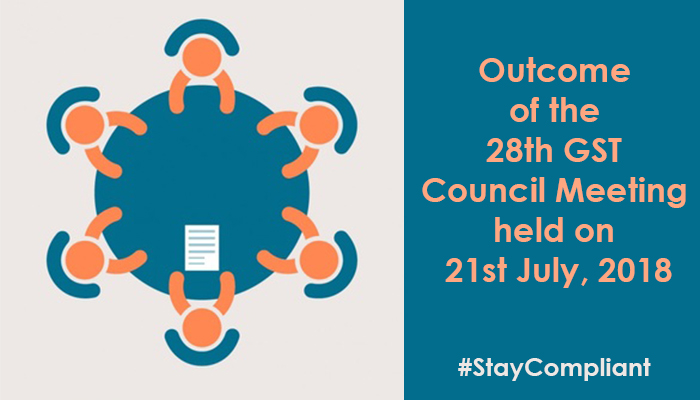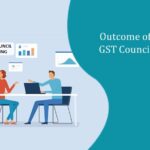The GST Council has held its 28th meeting in New Delhi on 21st July, 2018. In the meeting, GST council has broadly taken the following decisions –
A. Amendments to the CGST Act, 2017, IGST Act, 2017, UTGST Act2017, and GST (Compensation to States) Act, 2017
GST Council has recommended certain amendments in the CGST Act, IGST Act, UTGST Act and the GST (Compensation to States) Act. The major recommendations are as detailed below:
- Upper limit of turnover for opting for composition scheme to be raised from Rs. 1 crore to Rs. 1.5 crore.
- The threshold exemption limit for registration in the States of Assam, Arunachal Pradesh, Himachal Pradesh, Meghalaya, Sikkim and Uttarakhand to be increased to Rs. 20 Lakhs from Rs. 10 Lakhs.
- Taxpayers may opt for multiple registrations within a State/Union territory in respect of multiple places of business located within the same State/Union territory.
- Mandatory registration is required for only those e-commerce operators who are required to collect tax at source.
- In case the recipient fails to pay the due amount to the supplier within 180 days from the date of issue of invoice, the input tax credit availed by the recipient will be reversed, but liability to pay interest is being done away with.
- Scope of input tax credit is being widened.
- Registered persons may issue consolidated credit/debit notes in respect of multiple invoices issued in a Financial Year
- Recovery can be made from distinct persons, even if present in different State/Union territories.
These amendments will be placed before the Parliament and the legislature of State and Union territories with legislatures for carrying out the amendments in the respective GST Acts
B. Simplified GST Return
The council has approved the new return formats and associated changes in law-
- All taxpayers excluding small taxpayers and a few exceptions like ISD etc. shall requires to file one monthly return. The return is simple with two main tables. One for reporting outward supplies and one for availing input tax credit based on invoices uploaded by the supplier. Invoices can be uploaded continuously by the seller and can be continuously viewed and locked by the buyer for availing input tax credit. This process would ensure that very large part of the return is automatically filled based on the invoices uploaded by the buyer and the seller. Simply put, the process would be “UPLOAD – LOCK – PAY” for most tax payers.
- Taxpayers would have facility to create his profile based on nature of supplies made and received. The fields of information which a taxpayer would be shown and would be required to fill in the return would depend on his profile
- NIL return filers (no purchase and no sale) shall be given facility to file return by sending SMS.
- The Council approved quarterly filing of return for the small taxpayers having turnover below Rs. 5 Cr as an optional facility. Quarterly return shall be similar to main return with monthly payment facility but for two kinds of registered persons – small traders making only B2C supply or making B2B + B2C supply. For such taxpayers, simplified returns have been designed called Sahaj and Sugam. In these returns details of information required to be filled is lesser than that in the regular return.
- The new return design provides facility for amendment of invoice and also other details filed in the return. Amendment shall be carried out by filing of a return called amendment return. Payment would be allowed to be made through the amendment return as it will help save interest liability for the taxpayers.
C. Opening of migration window for tax payers till 31st August ,2018
The GST Council has approved the proposal to open the migration window for taxpayers, who received provisional IDs but could not complete the migration process. The taxpayers who filed Part A of FORM GST REG-26, but not Part B of the said FORM are requested to approach the jurisdictional Central Tax/State Tax nodal officers with the necessary details on or before 31st August, 2018.
It has also been decided to waive the late fee payable for delayed filing of return in such cases. Such taxpayers are required to first file the returns on payment of late fees, and the waiver will be effected by way of reversal of the amount paid as late fees in the cash ledger under the tax head
D. Rate Changes
The GST Council has taken various decisions relating to exemptions / changes in GST rates / ITC eligibility criteria, rationalization of rates / exemptions and clarification on levy of GST on Goods and services. The major recommendations are as-
- Hotel industry has been given major relief by providing that the rate of tax on accommodation service shall be based on transaction value instead of declared tariff.
- GST on supply of e-books has been reduced from 18% to 5%.
- Services provided in sectors like banking, IT have been provided relief by exempting services supplied by an establishment of a person in India to any establishment of that person outside India [related party].
- Rates for 17 white goods including – Washing machines, Refrigerators, TV, Vacuum cleaners etc. cut by 10% from 28 % to 18%.
- Sanitary napkins has now been exempted from GST
- GST rate reduced from 28% to 18% for paints and varnishes
- Footwear up to Rs.1,000/- now under 5% GST Rate slab.
It is proposed to issue notifications giving effect to these recommendations of the Council with effect from 27th July , 2018
For more information please refer the attached Press Releases
Source: Press Information Bureau – Government of India





